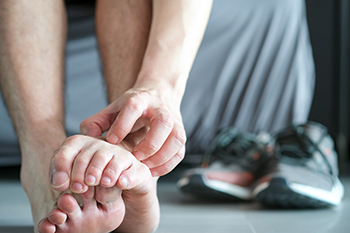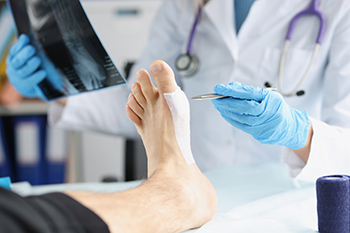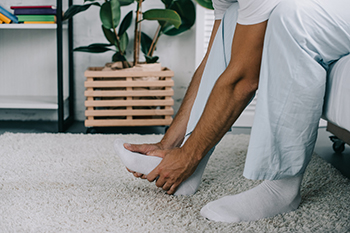Connect With Us
Blog
Items filtered by date: June 2024
Symptoms and Diagnosis of Athlete's Foot

Athlete's foot is a common fungal infection affecting the skin on the feet, particularly between the toes. Symptoms include itching, burning, and stinging sensations, often accompanied by redness, peeling, and cracking skin. The affected areas may also appear swollen and develop blisters. Diagnosis typically involves a physical examination by a podiatrist, who may scrape a small sample of the affected skin to examine under a microscope or send it to a lab for testing. Identifying the presence of fungal elements confirms the diagnosis. Early recognition and treatment of athlete's foot are essential to relieve discomfort and prevent the infection from spreading. Proper hygiene, antifungal medications, and keeping the feet dry and clean are effective measures to manage and prevent athlete's foot. Athlete’s foot can be uncomfortable and unsightly. If you have any of the above symptoms, it is suggested that you consult a podiatrist who can successfully treat this condition, which may include prescribed medication.
Athlete’s Foot
Athlete’s foot is often an uncomfortable condition to experience. Thankfully, podiatrists specialize in treating athlete’s foot and offer the best treatment options. If you have any questions about athlete’s foot, consult with one of our podiatrists from Omega Podiatry. Our doctors will assess your condition and provide you with quality treatment.
What Is Athlete’s Foot?
Tinea pedis, more commonly known as athlete’s foot, is a non-serious and common fungal infection of the foot. Athlete’s foot is contagious and can be contracted by touching someone who has it or infected surfaces. The most common places contaminated by it are public showers, locker rooms, and swimming pools. Once contracted, it grows on feet that are left inside moist, dark, and warm shoes and socks.
Prevention
The most effective ways to prevent athlete’s foot include:
- Thoroughly washing and drying feet
- Avoid going barefoot in locker rooms and public showers
- Using shower shoes in public showers
- Wearing socks that allow the feet to breathe
- Changing socks and shoes frequently if you sweat a lot
Symptoms
Athlete’s foot initially occurs as a rash between the toes. However, if left undiagnosed, it can spread to the sides and bottom of the feet, toenails, and if touched by hand, the hands themselves. Symptoms include:
- Redness
- Burning
- Itching
- Scaly and peeling skin
Diagnosis and Treatment
Diagnosis is quick and easy. Skin samples will be taken and either viewed under a microscope or sent to a lab for testing. Sometimes, a podiatrist can diagnose it based on simply looking at it. Once confirmed, treatment options include oral and topical antifungal medications.
If you have any questions, please feel free to contact our offices located in Los Angeles, Huntington Park, and Reseda, CA . We offer the newest diagnostic and treatment technologies for all your foot care needs.
Taking Care of Feet While Traveling
 Traveling often leads to tired and achy feet due to prolonged periods of walking, standing, or sitting. These activities can cause swelling, discomfort, and fatigue in the feet, especially when confined to tight spaces like airplane cabins or car seats. The lack of movement restricts blood flow, causing fluid to pool in the lower extremities. This can result in a sensation of heaviness, throbbing, or even pain. To soothe tired and achy feet while traveling, take regular breaks to stretch and walk around, promoting better circulation. Elevate your feet when possible to reduce swelling. Wearing comfortable, supportive shoes and compression socks can also alleviate discomfort. Gentle foot massages can help reduce inflammation and provide relief. Additionally, staying hydrated and avoiding excessive salt intake can also prevent fluid retention. If foot pain persists or becomes severe, it is suggested that you visit a podiatrist for a thorough evaluation and personalized advice.
Traveling often leads to tired and achy feet due to prolonged periods of walking, standing, or sitting. These activities can cause swelling, discomfort, and fatigue in the feet, especially when confined to tight spaces like airplane cabins or car seats. The lack of movement restricts blood flow, causing fluid to pool in the lower extremities. This can result in a sensation of heaviness, throbbing, or even pain. To soothe tired and achy feet while traveling, take regular breaks to stretch and walk around, promoting better circulation. Elevate your feet when possible to reduce swelling. Wearing comfortable, supportive shoes and compression socks can also alleviate discomfort. Gentle foot massages can help reduce inflammation and provide relief. Additionally, staying hydrated and avoiding excessive salt intake can also prevent fluid retention. If foot pain persists or becomes severe, it is suggested that you visit a podiatrist for a thorough evaluation and personalized advice.
Foot Pain
Foot pain can be extremely painful and debilitating. If you have a foot pain, consult with one of our podiatrists from Omega Podiatry. Our doctors will assess your condition and provide you with quality foot and ankle treatment.
Causes
Foot pain is a very broad condition that could be caused by one or more ailments. The most common include:
- Bunions
- Hammertoes
- Plantar Fasciitis
- Bone Spurs
- Corns
- Tarsal Tunnel Syndrome
- Ingrown Toenails
- Arthritis (such as Gout, Rheumatoid, and Osteoarthritis)
- Flat Feet
- Injury (from stress fractures, broken toe, foot, ankle, Achilles tendon ruptures, and sprains)
- And more
Diagnosis
To figure out the cause of foot pain, podiatrists utilize several different methods. This can range from simple visual inspections and sensation tests to X-rays and MRI scans. Prior medical history, family medical history, and any recent physical traumatic events will all be taken into consideration for a proper diagnosis.
Treatment
Treatment depends upon the cause of the foot pain. Whether it is resting, staying off the foot, or having surgery; podiatrists have a number of treatment options available for foot pain.
If you have any questions, please feel free to contact our offices located in Los Angeles, Huntington Park, and Reseda, CA . We offer the newest diagnostic and treatment technologies for all your foot care needs.
Heel Pain Can Be Treated!
Minor Foot Surgery
 Minor foot surgery encompasses a range of procedures aimed at addressing common foot problems with minimal invasiveness. These surgeries are often performed to correct issues like ingrown toenails, bunions, hammertoes, and plantar warts. Ingrown toenail surgery involves removing part or all of the affected nails to relieve pain and prevent infection. Bunion surgery, or a bunionectomy, involves realigning the bone, ligaments, and tendons to correct the deformity. Hammertoe surgery aims to straighten the bent toe by removing a portion of the bone or releasing the tendon. Plantar wart removal can be performed using various methods, including excision, laser therapy, or cryotherapy. These procedures are typically done on an outpatient basis under local anesthesia, allowing for quick recovery and minimal downtime. If you have any sort of foot problem, it is suggested that you schedule an appointment with a podiatrist. After a thorough examination and imaging tests, the best treatment, which may include minor surgery, will be discussed.
Minor foot surgery encompasses a range of procedures aimed at addressing common foot problems with minimal invasiveness. These surgeries are often performed to correct issues like ingrown toenails, bunions, hammertoes, and plantar warts. Ingrown toenail surgery involves removing part or all of the affected nails to relieve pain and prevent infection. Bunion surgery, or a bunionectomy, involves realigning the bone, ligaments, and tendons to correct the deformity. Hammertoe surgery aims to straighten the bent toe by removing a portion of the bone or releasing the tendon. Plantar wart removal can be performed using various methods, including excision, laser therapy, or cryotherapy. These procedures are typically done on an outpatient basis under local anesthesia, allowing for quick recovery and minimal downtime. If you have any sort of foot problem, it is suggested that you schedule an appointment with a podiatrist. After a thorough examination and imaging tests, the best treatment, which may include minor surgery, will be discussed.
Foot surgery is sometimes necessary to treat a foot ailment. To learn more, contact one of our podiatrists of Omega Podiatry. Our doctors will assist you with all of your foot and ankle needs.
When Is Surgery Necessary?
Foot and ankle surgery is generally reserved for cases in which less invasive, conservative procedures have failed to alleviate the problem. Some of the cases in which surgery may be necessary include:
- Removing foot deformities like bunions and bone spurs
- Severe arthritis that has caused bone issues
- Cosmetic reconstruction
What Types of Surgery Are There?
The type of surgery you receive will depend on the nature of the problem you have. Some of the possible surgeries include:
- Bunionectomy for painful bunions
- Surgical fusion for realignment of bones
- Neuropathy decompression surgery to treat nerve damage
Benefits of Surgery
Although surgery is usually a last resort, it can provide more complete pain relief compared to non-surgical methods and may allow you to finally resume full activity.
Surgical techniques have also become increasingly sophisticated. Techniques like endoscopic surgery allow for smaller incisions and faster recovery times.
If you have any questions please feel free to contact our offices located in Los Angeles, Huntington Park, and Reseda, CA . We offer the newest diagnostic and treatment technologies for all your foot and ankle needs.
Foot Health Can Be a Reflection of Overall Wellness

Foot health serves as a silent communicator, often revealing underlying issues within the body. Foot cramps, seemingly innocuous, can indicate dehydration or nutrient deficiencies, while swollen feet may signify heart, kidney, or circulatory problems. Cold feet could be a sign of poor circulation or thyroid dysfunction, requiring attention to prevent further complications. Similarly, tingling sensations in the feet may point to a pinched nerve elsewhere in the body. Ignoring these signals can lead to developing health issues over time. Paying attention to foot health is thus imperative, not just for comfort but for overall well-being. Regular foot care, including proper footwear, moisturizing, and gentle exercises, can promote circulation and alleviate discomfort. However, if symptoms persist, it is suggested that you consult a podiatrist for an accurate diagnosis and appropriate treatment.
When dealing with systemic disease of the feet, it is extremely important to check the affected areas routinely so that any additional problems are caught quickly. If you have any concerns about your feet and ankles contact one of our podiatrists from Omega Podiatry. Our doctors will assist you with all of your podiatric needs.
Systemic Diseases of the Feet
Systemic diseases affect the whole body, and symptoms usually are displayed in the feet. This condition can make a patient’s ability to walk unbearable. Systemic diseases include gout, diabetes mellitus, neurological disorders, and arthritis.
Gout – is caused by an excess of uric acid in the body. Common symptoms include pain, inflammation, and redness at the metatarsal/phalangeal joint of the base big toe. Gout can be treated by NSAIDs to relieve pain and inflammation, and other drugs that lower the acid levels in the body.
Diabetes mellitus – is an increase in the level of blood sugar that the body cannot counteract with its own insulin. Failure to produce enough insulin is a factor in Diabetes.
Diabetes of the Feet
Diabetic Neuropathy – may lead to damaged nerves and affect the feet through numbness and loss of sensation.
Peripheral Vascular Disease – can restrict the blood flow to the feet, and often times lead to amputation of the feet.
If you have any questions please feel free to contact our offices located in Los Angeles, Huntington Park, and Reseda, CA . We offer the newest diagnostic and treatment technologies for all your foot and ankle needs.

